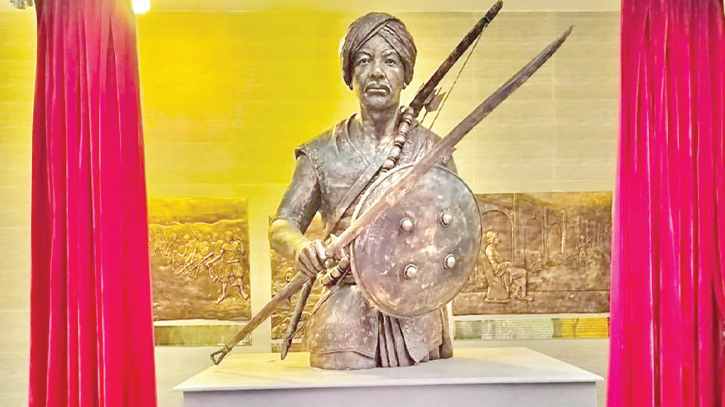
Photo : Messenger
The unsung hero, U Tirot Sing, was a Khasi Raja in Meghalaya for more than four years (1829–1833). The fiercely independent Khasi tribes fought the British invaders to keep the Khasi Hills independent.
On Friday, a colourful event unveiled the statue of the anti-British indomitable warrior at a memorial at the Indira Gandhi Cultural Centre in Dhanmondi.
The memorial at Dhaka will commemorate and honour the heroic martyrdom of the first braveheart, U Tirot Sing, in the Indian subcontinent, who has steadfastly emerged as a symbolic figure of the Khasi’s spirit and resilience.
U Tirot Sing is celebrated as the hero of the Khasi Hills and is esteemed for his unparalleled warfare tactics, bravery, and unyielding resistance against British colonial rule.
The memorial marked a poignant tribute to Tirot Sing’s enduring legacy of resistance against British colonialism.
After 189 years, U Tirot Sing, who was captured by the British East India Company troops, was jailed for treason, sedition, and waging war against the British colonialists in January 1833.
Initially, he was treated as a common prisoner; later, in honour of being the King of Khasi Hills, he was moved to a bungalow in Dhaka. The place of his house arrest is presumed to be at the present Circuit House, near Bailey Road. The house was demolished, and there was no sign of the bungalow.
The rebellion against the British began much before the Sepoy Mutiny in Dhaka in 1857. He was martyred on July 17, 1835.
Journalist Haroon Habib, who wrote several articles about the hero, said his death was mysterious. He had possibly been poisoned and said no evidence could be found.
The memorial at Dhaka is a historic development and an outcome of the collective and collaborative efforts led by the Department of Arts and Culture, Government of Meghalaya, with the cooperation of the Indian Ministry of External Affairs, the Indian High Commission at Dhaka, the Indian Council for Cultural Relations (ICCR), and the IGCC (Indira Gandhi Cultural Centre).
Pranay Verma, the Indian High Commissioner to Bangladesh, said a strong historical bond between Meghalaya and Bangladesh has been established.
He recalled that the Khasi Hills extended their hospitality to thousands of Mukti Bahini and war refugees in Meghalaya. The statue in Dhaka will once again honour the legacy of the freedom struggle in the 19th century and the 1971 liberation war.
The Commissioner of the Department of Arts and Culture of Meghalaya State, Frederick Roy Kharkongor, took the initiative to honour the unsung hero in Dhaka.
The birth of this memorial project dates back to August last year, when Indian High Commissioner Verma conveyed approval for its establishment in Dhaka, Kharkongor told The Daily Messenger.
He said the warrior fought the British with bows, arrows, spears, and swords. The first ever recorded history of guerrilla warfare in India was hiding in the caves. A tribal resistance movement exists in the region, he remarked.
Historian and former Chairman of the Union Public Service Commission, David R. Syiemlieh, shed light on Tirot Sing’s remarkable life and bravery, recounting his pivotal role in leading an attack against colonial forces on April 8, 1829.
To establish the memorial, a delegation of the Meghalayan government arrived in Bangladesh to attend the historic unveiling of a life-size statue and bust of a Khasi freedom fighter by Shillong-based sculptor Raphael Warjri.
Also attending were Deputy Chief Minister Sniawbhalang Dhar, Art and Culture Minister Paul Lyngdoh, Commissioner, and David Syiemlieh, an authority on the Sing’s tragedy.
Much earlier, in 1826, Assam, including the northern foothills of the Khasi Hills, was annexed to the territories of the East India Company’s rule under the Diwani of Bengal of 1765.
A cultural ensemble on Khasi culture, music, and dance was held at Shilpakala Academy on Friday evening, titled “U Syiem Tirot Sing—U Khla Wait Ka Ri Khasi.”.
On the occasion, two animated books detailing the remarkable life and struggles of U Tirot Sing Syiem were launched.
David Syiemlieh told The Daily Messenger that Tirot surely wanted to return to the hill forests, but unfortunately, he had to die in a city of concrete.
Messenger/Disha








